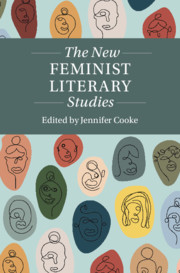Book contents
- The New Feminist Literary Studies
- Twenty-First-Century Critical Revisions
- The New Feminist Literary Studies
- Copyright page
- Contents
- Illustrations
- Contributors
- Introduction
- I Frontiers
- II Fields
- III Forms
- Chapter 11 Feminist Dwellings: Imagining the Domestic in the Twenty-first-century Literary Novel
- Chapter 12 Who Rules the World? Reimagining the Contemporary Feminist Dystopia
- Chapter 13 Transnational Feminism and the Young Adult Novel
- Chapter 14 Feminist Manuals and Manifestos in the Twenty-first Century
- Chapter 15 ‘This is not a memoir’: Feminist Writings from Life
- Chapter 16 Feminist Poetries of the Open Wound
- Bibliography
- Index
Chapter 12 - Who Rules the World? Reimagining the Contemporary Feminist Dystopia
from III - Forms
Published online by Cambridge University Press: 16 November 2020
- The New Feminist Literary Studies
- Twenty-First-Century Critical Revisions
- The New Feminist Literary Studies
- Copyright page
- Contents
- Illustrations
- Contributors
- Introduction
- I Frontiers
- II Fields
- III Forms
- Chapter 11 Feminist Dwellings: Imagining the Domestic in the Twenty-first-century Literary Novel
- Chapter 12 Who Rules the World? Reimagining the Contemporary Feminist Dystopia
- Chapter 13 Transnational Feminism and the Young Adult Novel
- Chapter 14 Feminist Manuals and Manifestos in the Twenty-first Century
- Chapter 15 ‘This is not a memoir’: Feminist Writings from Life
- Chapter 16 Feminist Poetries of the Open Wound
- Bibliography
- Index
Summary
There are three problems with Anglo-American twenty-first century feminist dystopian imaginings: a lack of critical dystopias, that is, texts that carefully balance utopia and dystopia in order to retain political motivational power; the imaginative exploitation of female suffering for commercial gain, in particular the commodification of Black pain; and, a lack of critical distance from reality. This chapter considers how feminist critical dystopias might be reimagined from an intersectional twenty-first-century perspective, both theoretically and through literary criticism. Darko Suvin’s theory of science fiction identifies the necessity of estrangement, and of balancing utopia and dystopia to retain the politically motivating power of critique. The chapter interrogates Suvin’s concept of the ‘zero world’ from a feminist perspective, suggesting that contemporary feminist critical dystopias might be most empowered and empowering if mapped in relation to the (almost) universal zero world of women not in power. The second section comprises an analysis of Naomi Alderman’s The Power (2016) as an example of a contemporary feminist dystopia that performs these theoretical requirements.
Keywords
- Type
- Chapter
- Information
- The New Feminist Literary Studies , pp. 169 - 181Publisher: Cambridge University PressPrint publication year: 2020
- 2
- Cited by

